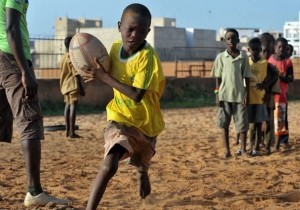
Although the rugby world’s attention is understandably focused on the New Zealand-France match that will determine the world champion this weekend, Ecouter La Radio has a story (also available here in the original French) on an organization that is using rugby to help change the lives of poor children in Senegal.
It is easy to get caught up in sport at its highest level. In rugby that means focusing on national team competitions, on the professional game, on the elite club sides. In Africa this almost always means the Springboks, the Tri-Nations and World Cup, the Super 16, the Currie Cup, with occasional feints to minnows Kenya and Namibia and Zimbabwe. And yet as with any sport, while most people might fixate on elite performances as public entertainment, the fact is that we need to take a broader view of what sport means in society. While the tiny slice of the population that plays sport for a living garners most of the headlines, the vast majority of athletes will never play on television and will see their competitive careers end somewhere well before they are old enough to vote.
Thus society ought to spend more time connecting sport to lived reality rather than to its fantastical ideal. Using sport to help get kids through school or to teach valuable life lessons. And before we get too carried away in sport’s all-powerful capacity to change, sports are also fun, and for children fun is an ends all on its own. This is why I hoped that one of the outcomes of the FIFA World Cup would be to help bring greater access to football to kids throughout South Africa. Whether or not that goal will be realized is dubious and progress seems so far to be faltering. But the ideal still remains, and in one tiny slice of Senegal people are trying to realize that ideal.